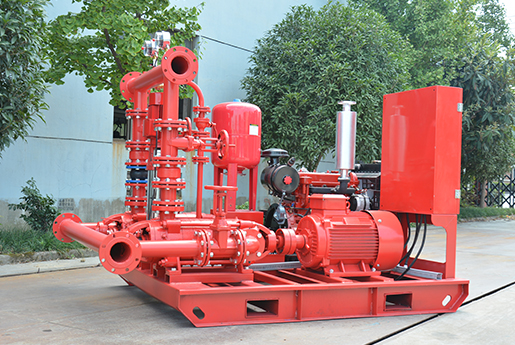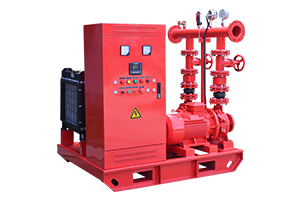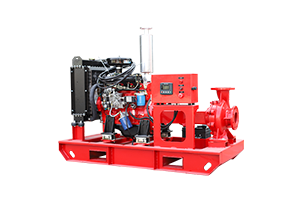-
 Apr 25, 2023Why do fire pumps form water hammer?Water hammer is a common issue with fire pumps, and it is important to understand the causes of this phenomenon in order to ensure that the pump is not damaged by it. Water hammer is caused by a sudden pressure increase in the system, caused by the inertia of the water when it is subjected to a sudden change in velocity. Fire pumps are particularly prone to water hammer due to their high flow rates, which can cause a rapid change in pressure when the flow of water is suddenly stopped or reversed.
Apr 25, 2023Why do fire pumps form water hammer?Water hammer is a common issue with fire pumps, and it is important to understand the causes of this phenomenon in order to ensure that the pump is not damaged by it. Water hammer is caused by a sudden pressure increase in the system, caused by the inertia of the water when it is subjected to a sudden change in velocity. Fire pumps are particularly prone to water hammer due to their high flow rates, which can cause a rapid change in pressure when the flow of water is suddenly stopped or reversed.
The first cause of water hammer in fire pumps is the sudden closure of a valve, which, when suddenly shut, causes a sudden pressure increase in the system. This pressure increase is then transmitted through the pipe, creating a shock wave that is known as a water hammer. Another cause of water hammer in fire pumps is the sudden reverse in the flow of water, which can be caused by the sudden slowing or stoppage of the pump. This reverse flow causes a pressure surge that can cause water hammer.
The effects of water hammer can range from minor vibrations to severe pipe damage, depending on the severity of the pressure surge. In addition, water hammer can cause excessive noise and lead to pipe leaks, both of which can be costly to repair. To prevent water hammer, it is important to install dampers, which are designed to absorb the shock wave and dissipate the energy before it reaches the pipes. Additionally, proper maintenance of the valves and pump systems can help to minimize the risk of water hammer.
Finally, it is important to ensure that the fire pump system is properly sized for the system, as an oversized pump can cause a sudden pressure increase and lead to water hammer. Additionally, the installation of the pump should be done correctly, with proper alignment of the pipes and pump to ensure that the flow of water is not restricted.
In conclusion, water hammer is a common issue with fire pumps, and it is important to understand the causes of this phenomenon in order to ensure that the pump is not damaged by it. The main causes of water hammer in fire pumps are the sudden closure of a valve, the sudden reversal of the flow of water, and improper sizing of the pump. To prevent water hammer, it is important to install dampers, maintain the valves and pump systems, and ensure that the fire pump system is properly sized for the system.View details -
 Apr 24, 2023What are the reasons for the axial force of the fire pump?The axial force of a fire pump is the force that is generated when the pump is running. This force is necessary to ensure that the pump is able to perform its intended job. The axial force is generated by a combination of the pump’s design, the pump’s operation, and the environment in which the pump is operating.
Apr 24, 2023What are the reasons for the axial force of the fire pump?The axial force of a fire pump is the force that is generated when the pump is running. This force is necessary to ensure that the pump is able to perform its intended job. The axial force is generated by a combination of the pump’s design, the pump’s operation, and the environment in which the pump is operating.
The design of a fire pump is the main factor that contributes to the axial force. The design of the pump determines the amount of force that is generated when the pump is in operation. This force is necessary to ensure that the pump is able to move the water from the supply to the destination. The design of the pump also affects the efficiency of the pump and the amount of water that is able to be moved.
The operation of the fire pump also contributes to the axial force. The operation of the pump is determined by the amount of pressure that is created when the pump is running. This pressure is necessary to ensure that the pump is able to move the water from the supply to the destination. The pressure also affects the efficiency of the pump and the amount of water that is able to be moved.
The environment in which the fire pump is operating also contributes to the axial force. The environment affects the amount of pressure that is generated when the pump is in operation. This pressure is necessary to ensure that the pump is able to move the water from the supply to the destination. The environment also affects the efficiency of the pump and the amount of water that is able to be moved.
In conclusion, the axial force of a fire pump is generated by a combination of the pump’s design, the pump’s operation, and the environment in which the pump is operating. This force is necessary to ensure that the pump is able to perform its intended job. The design of the pump, the operation of the pump, and the environment in which the pump is operating all affect the amount of force that is generated when the pump is in operation.View details -
 Apr 24, 2023Advantages and disadvantages of self-balancing device for axial force of floating impeller of fire pumpIntroduction
Apr 24, 2023Advantages and disadvantages of self-balancing device for axial force of floating impeller of fire pumpIntroduction
The self-balancing device for axial force of floating impeller of fire pump is a new type of impeller used in fire pumps. It has the advantage of being able to maintain a relatively even axial force on the impeller, reducing the possibility of a catastrophic failure due to uneven loading on the impeller. This article will discuss the advantages and disadvantages of using a self-balancing device for axial force of floating impeller of fire pump.
Advantages
One of the major advantages of using a self-balancing device for axial force of floating impeller of fire pump is that it helps to reduce the possibility of a catastrophic failure due to uneven loading on the impeller. This is because the device helps to ensure that the axial force is evenly distributed, which helps to reduce the risk of an unexpected breakdown. Additionally, the device helps to reduce the risk of damage to the pump and the impeller due to high vibration levels, which can be caused by an uneven axial force.
Another benefit of using a self-balancing device for axial force of floating impeller of fire pump is that it helps to increase the efficiency of the fire pump. This is because the device helps to ensure that the axial force is evenly distributed, which helps to reduce the amount of power loss due to drag. Additionally, the device helps to reduce the risk of cavitation, which can reduce the efficiency of the fire pump.
Disadvantages
One of the major disadvantages of using a self-balancing device for axial force of floating impeller of fire pump is that it can be relatively expensive. This is because the device requires additional components and materials to be manufactured and installed, which can be expensive. Additionally, the device can be difficult to install, requiring additional time and labour to complete the installation process.
Another disadvantage of using a self-balancing device for axial force of floating impeller of fire pump is that it can be difficult to maintain. This is because the device requires regular maintenance to ensure that it is functioning correctly, which can be time consuming and costly. Additionally, the device can be susceptible to wear and tear, which can reduce its effectiveness over time.
Conclusion
The self-balancing device for axial force of floating impeller of fire pump is a useful device that can help to reduce the risk of a catastrophic failure due to uneven loading on the impeller. However, the device can be relatively expensive and difficult to maintain, which can be a disadvantage for some users. It is important to weigh the advantages and disadvantages of using the device before making a decision.View details -
 Apr 24, 2023How to set up the new axial force balance device of fire pump?Introduction
Apr 24, 2023How to set up the new axial force balance device of fire pump?Introduction
The axial force balance device of a fire pump is a critical component of the fire pump and its installation is essential for the proper functioning of the pump. In this article, we will discuss the steps needed to set up and install the axial force balance device of a fire pump.
Requirements
Before setting up the axial force balance device of a fire pump, it is important to make sure that the necessary tools and supplies are available. This includes a power drill, a set of wrenches, a screwdriver, a level, and the appropriate mounting hardware. Additionally, the fire pump and its components must be in good working order and fit to be used.
Installation
Once the necessary tools and supplies are available, the installation of the axial force balance device of a fire pump can begin. The first step is to secure the mounting hardware to the fire pump. This can be done by drilling holes into the pump body and then using the screws and bolts provided to securely attach the mounting hardware. After the hardware has been attached, the axial force balance device can be placed onto the mounting hardware and secured with the wrenches.
Adjustments
Once the axial force balance device is installed, it is important to make sure that the device is set up correctly. This includes adjusting the tension of the bolts, the height of the axial force balance device, and the settings of the control panel. These adjustments should be made according to the manufacturer's instructions.
Conclusion
In conclusion, the installation of the axial force balance device of a fire pump is a critical component of the pump and its proper functioning. With the necessary tools and supplies, the installation can be completed by securing the mounting hardware, placing the device onto the mounting hardware, and adjusting the tension, height, and settings of the control panel. Following these steps will ensure that the axial force balance device of a fire pump is properly installed and functioning correctly.View details -
.jpg) Apr 24, 2023What is the critical speed of the pump shaft of the fire pump?Introduction
Apr 24, 2023What is the critical speed of the pump shaft of the fire pump?Introduction
The critical speed of the pump shaft of a fire pump is an important factor in determining the performance of the pump. It is the speed at which the rotor of the pump begins to vibrate, and it is important to know what the critical speed of the pump is in order to ensure that it is operating safely and efficiently. In this article, we will explore what the critical speed of the pump shaft of the fire pump is and why it is important.
What is the Critical Speed of a Pump Shaft?
The critical speed of the pump shaft of a fire pump is the speed at which the pump rotor begins to vibrate. This vibration is a result of the centrifugal force that is generated by the rotation of the rotor. At this speed, the centrifugal force is greater than the bearing support provided by the bearings, and the rotor begins to vibrate.
Importance of Critical Speed
The critical speed of the pump shaft of the fire pump is important because it helps to determine the performance of the pump. If the pump is operating at a speed that is higher than the critical speed, it can lead to excessive vibration which can cause damage to the pump and can also reduce its efficiency. Therefore, it is important to ensure that the pump is never operated at a speed that is higher than the critical speed.
Calculating Critical Speed
The critical speed of the pump shaft of the fire pump can be calculated using the following equation:
Critical Speed = √(Gravity * Radius * Shaft Length) / (2 * pi * Density)
Where G is the acceleration due to gravity, R is the radius of the rotating shaft, L is the length of the shaft, and D is the density of the material that the shaft is made of.
Conclusion
The critical speed of the pump shaft of the fire pump is an important factor in determining the performance of the pump. It is the speed at which the rotor of the pump begins to vibrate, and it is important to ensure that the pump is not operated at a speed that is higher than the critical speed. The critical speed can be calculated using the equation provided above.View details -
 Apr 21, 2023What kind of fire pump should be selected for the fire water supply system of high-rise buildings?High-rise buildings are particularly prone to fires due to their large size and high-density population. Therefore, it is essential that these buildings are equipped with a reliable fire water supply system to ensure the safety of its occupants. This system typically includes a fire pump, which is responsible for supplying the necessary water pressure to the firefighting system.
Apr 21, 2023What kind of fire pump should be selected for the fire water supply system of high-rise buildings?High-rise buildings are particularly prone to fires due to their large size and high-density population. Therefore, it is essential that these buildings are equipped with a reliable fire water supply system to ensure the safety of its occupants. This system typically includes a fire pump, which is responsible for supplying the necessary water pressure to the firefighting system.
When selecting a fire pump for a high-rise building, it is important to consider the type of fire protection system that is installed. For example, a fire suppression system such as sprinklers requires a higher pressure than a wet-pipe system. Therefore, if the building has a sprinkler system, a high-pressure pump should be selected to ensure adequate water pressure.
Another factor to consider is the size of the building. High-rise buildings typically require larger fire pumps to ensure that they can supply enough water to all areas of the building in the event of a fire. Additionally, the size of the pump should be selected based on the amount of water that is needed to fight the fire.
Additionally, the type of pump should be selected based on the type of fuel used in the building. For instance, if the building uses natural gas, an electrically powered pump should be selected. However, if the building uses diesel, then a diesel-powered pump should be selected.
Finally, the pump should be selected based on the type of water supply available. For instance, if the building has access to a municipal water supply, then a centrifugal pump should be selected. However, if the building has access to a private water source, then a positive displacement pump should be selected. Ultimately, selecting the right fire pump for a high-rise building is essential to ensuring the safety of its occupants. Therefore, it is important to consider all of these factors when making a selection.View details






